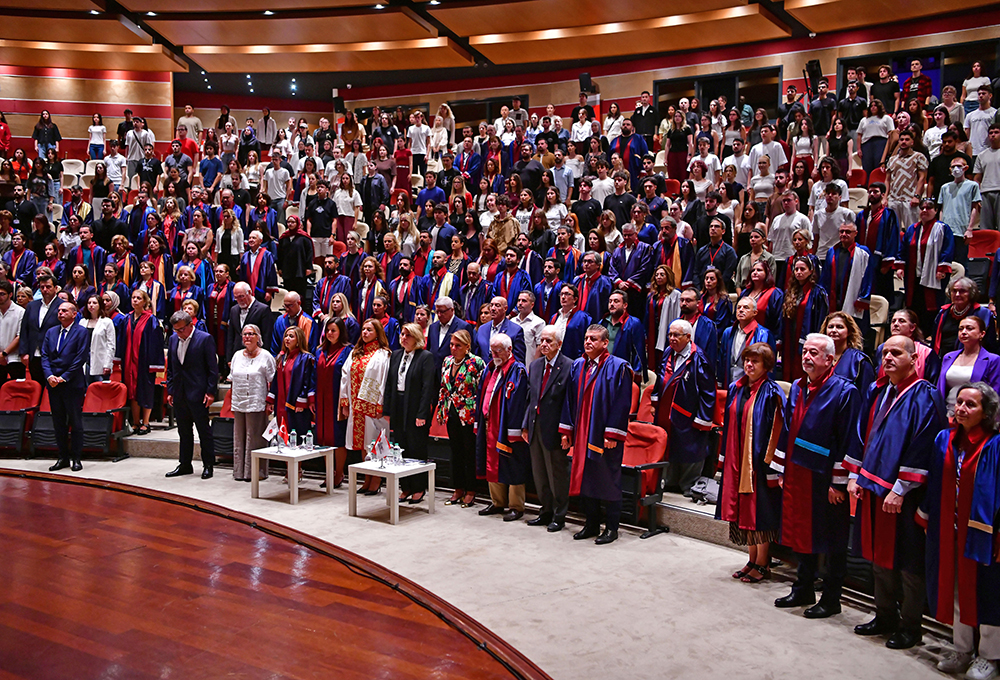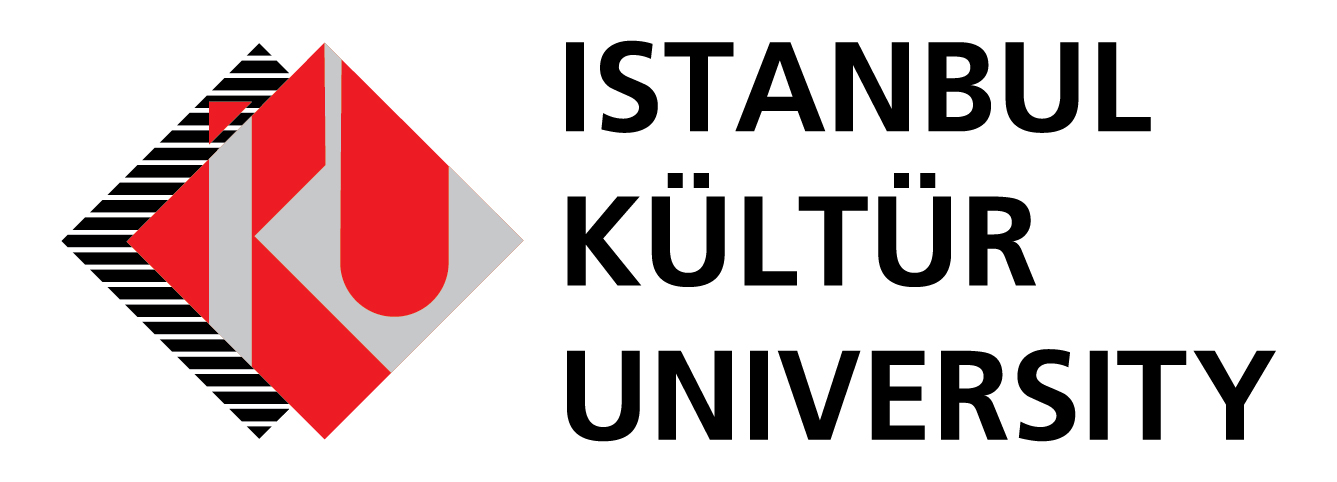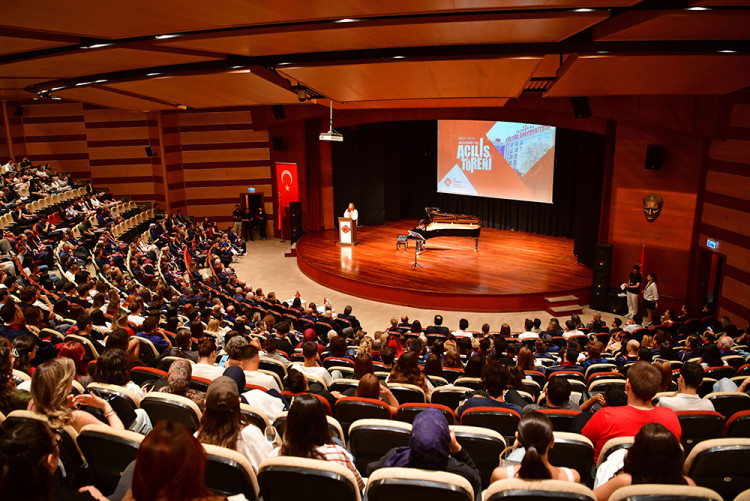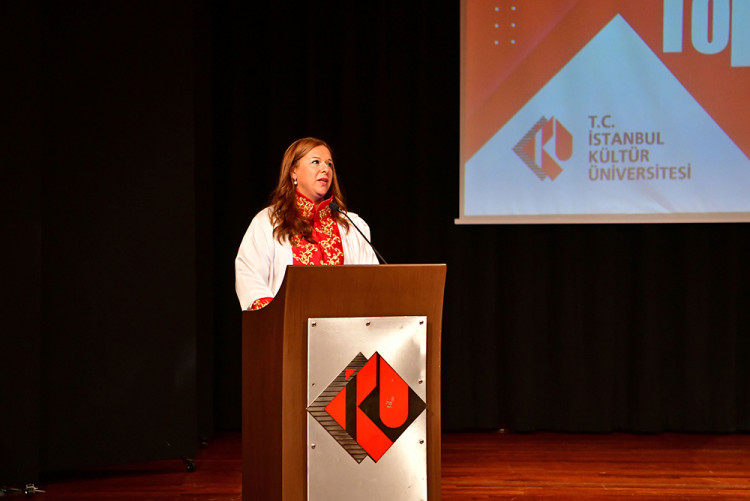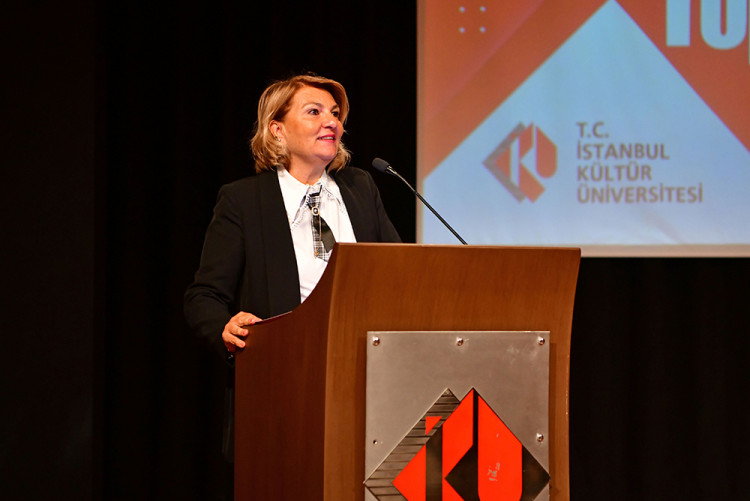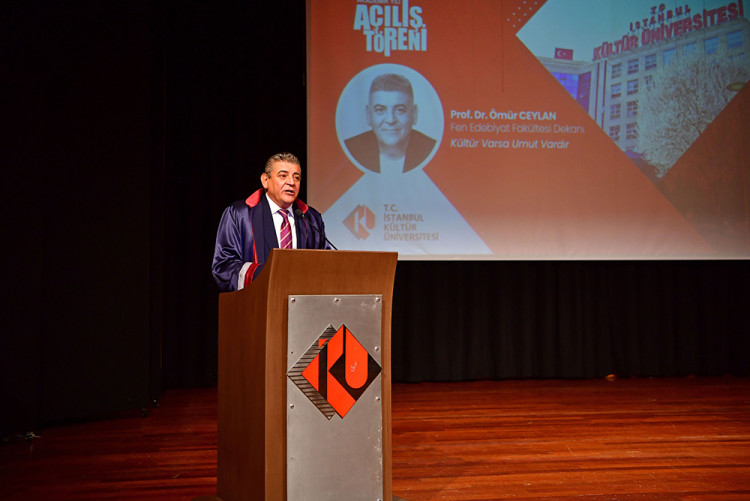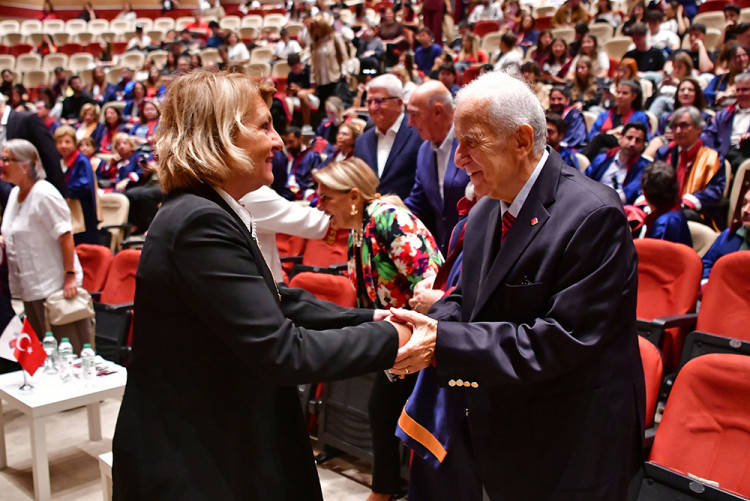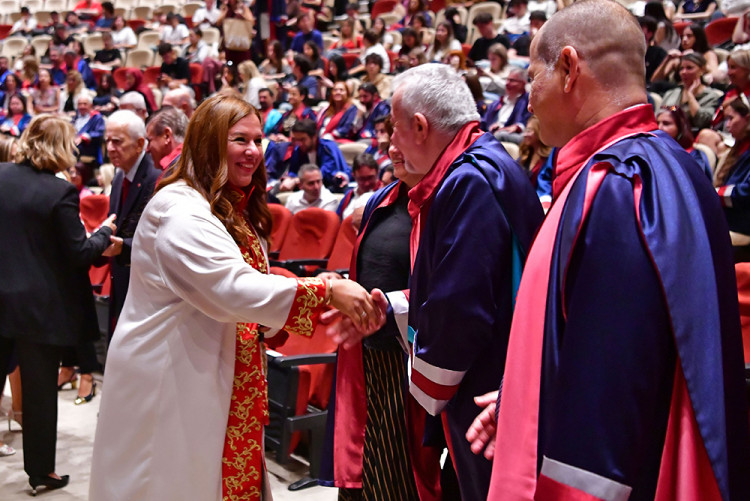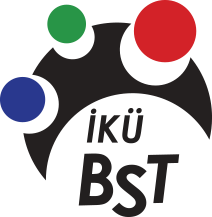The Istanbul Kültür University (IKU) 2025-2026 Academic Year was inaugurated on Wednesday, September 17, 2025, at 10:00 AM in the Akıngüç Auditorium and Art Center, with the participation of our Board of Trustees Chair Dr. Bahar Akıngüç Günver, Chairperson of the Board of Directors of Istanbul Kültür Educational Institutions (IKEK) & IKU Vice President of the Board of Trustees Ful Akıngüç Över, our Rector Prof. Dr. Fadime Üney Yüksektepe, Vice Rectors Prof. Dr. Gülce Öğrüç Ildız and Prof. Dr. Burcu Yavuz Tiftikçigil, Secretary General Ender Rıza Ekici, as well as academic and administrative staff and students.
The ceremony began with a moment of silence and the singing of the National Anthem. In her opening speech, Rector Prof. Dr. Fadime Üney Yüksektepe expressed the following:
"This year, we also have with us our new students who have chosen our university and are experiencing the excitement of becoming university students for the first time. First of all, I congratulate our new students and wish them success. As a foundation university, this year has been a period where we have deeply understood the importance of ethical competition and determination in education. Of course, our goal is to position the ‘Kültür’ brand in higher education at the highest point it deserves. I know that our entire academic and administrative staff is working with great effort for this, and I thank them.
Education, in its application and sociological dimension, cannot be considered independent of economic, political, and geographical conditions. It is influenced by both the country's and the world's tensions. Therefore, it is an area that is as strong as it is fragile. We have taken our place in higher education by carrying the educational philosophy of our Honorary President and Founder, M.Sc. Construction Engineer Fahamettin Akıngüç. We have adopted love for humanity and the country, secularism, the achievements of the Republic, and Atatürkism as our core values.
In both competition and promises, we have not deviated from ethical values. The following sentence from the biography of our Honorary President and Founder, M.Sc. Construction Engineer Fahamettin Akıngüç, serves as a guide for us: 'I believe that maintaining an educational institution is not only a matter of management and finance but also a matter of the heart.' We have internalized this belief. Last year, significant steps were taken to increase the brand value of Kültür in higher education. It may not be possible to cover each of them in a limited time frame, but to summarize; the Molecular Sciences and Spectroscopy Application and Research Center (IKU Spectra) was opened. We began accepting students for our English-language undergraduate program in Management Information Systems and our Associate Degree program in UAV Technology and Operation. We implemented the Micro-Credit application, which allows students' extracurricular activities to appear on their diploma supplement. We digitized and improved our academic performance and incentive systems. As part of our internationalization strategy, we have signed important memberships and collaborations.
Our university has also taken the first step in its new campus investment, which will mark its 30th anniversary. We are planning our groundbreaking ceremony for October 17, 2025. I would like to express our gratitude to our Board of Trustees Chair and Founder, Dr. Bahar Akıngüç Günver, who sustains IKU with its own resources and transfers all the earnings from education back into education with its values; to Dear Ful Akıngüç, Chairperson of the Founding Foundation's Board of Directors and Vice President of the Board of Trustees; and to Dear Lale Akıngüç, Board Member and Vice Chair of the Foundation’s Board of Directors, on behalf of our university."
Our Board of Trustees Chair Dr. Bahar Akıngüç Günver stated: "We are entering a new academic year together. First of all, I wish for the 2025-2026 academic year to be healthy and successful. We are a brand that has witnessed 65 years in K12 education and 28 years in higher education in Türkiye. I am specifically emphasizing the word 'brand' here because we have fought a very serious battle for the brand rights of Kültür in education for many years. In fact, the place of the Kültür brand was clear in the minds of all our stakeholders. However, it was necessary to prove this clarity in legal terms. It was a long and difficult struggle. This year, our effort has legally come to a conclusion. In Türkiye’s education, there is only one Kültür that is surrounded by Atatürkism, Republican Values, and Secular principles. It is a school founded by our Honorary President, M.Sc. Construction Engineer Fahamettin Akıngüç, inspired by the Principles and Revolutions of Atatürk. It is a great culture encompassing Kültür College, Kültür2000 College, the Kültür College Foundation, and Istanbul Kültür University. We would like to thank all the stakeholders who trusted us in the name rights case of Kültür on behalf of the Akıngüç Family.
I began my speech by emphasizing the importance we place on protecting the Kültür brand. However, there is another very important common issue I want to share with you today. The sensitivity we have shown to the name rights of our brand is also valid for two other important topics. The first is education, and the second is love for the country. Both are a matter of honor for us. Education has been going through a very great test in recent years. Its necessity and validity are being questioned. There are very harsh comments and criticisms.
Guided by the opinions of those who form opinions without knowledge, the sense and importance of education is being damaged more and more every day.
Today, we are gathered here as those who value education. It is our common purpose. We continue on this path, at our own address, with the values we believe in and uphold. Yet I would like to borrow a striking metaphor that summarizes today’s world from Ful Akıngüç, Chairperson of the Kültür Educational Foundation and the Board of Directors of Kültür Educational Institutions: “There is a storm outside.” The 21st century is blowing fiercely, both for our country and for the world. At this point, simply recognizing and safeguarding the value of education only within these boundaries is no longer sufficient. We are also obliged to protect its dignity in the eyes of society. Because we are educators.
Education is not only a personal right and freedom; it is also a vital necessity. Where this need is left unmet, the challenges that a nation and the world will face must be spoken of at every opportunity. And there is also the matter of self-reflection. At the point where education stands today, we cannot remain merely as questioners. We must also examine our own share in this course and allow self-critique to work within us. At a certain point, we must be willing to question ourselves.
If a young person asks, “What need is there for education?”, then it is time for us to pause and reflect. How has this distance grown between youth and education? Therefore, let this year be the year of restoring education to its rightful dignity. We must all take on responsibility and strive to understand the reasons that drive children, young people and even families to such questions.
Another vital matter is love for one’s country. Since the founding of Kültür Educational Foundation and Kültür Educational Institutions, patriotism has been upheld as a supreme value. At Kültür, from kindergarten to university, we have worked tirelessly to raise “world citizens who love their homeland.” Yet in today’s circumstances, one of the most striking and unsettling realities we witness is the growing “haste to leave” among young people.
To abandon the ideal of elevating our nation to the level of contemporary civilizations should not be so easily accepted. Our Founder and Honorary President, M.Sc. Civil Engineer Fahamettin Akıngüç, is a republican intellectual and a devoted Atatürkist. He laid the foundations of the Kültür identity during one of the gravest crises in our country’s history, the coup d’état of May 27, 1960. In spite of everything, with perseverance, courage, and determination, on September 26, 1960, our Honorary President, M.Sc. Civil Engineer Fahamettin Akıngüç, “brought Kültür into the nation’s service.”
Do not abandon your country! This, above all, is the greatest counsel given to us by our Honorary President, M.Sc. Civil Engineer Fahamettin Akıngüç. Yes, improve yourselves, open yourselves to the world, explore, work hard, but never leave your country behind. This nation needs, above all, the love of its most enlightened generations.
And the greatest legacy... The most profound advice... It is the words of our Great Leader Atatürk: “Remember me.” Today, and indeed in this century, those words carry an even deeper, more powerful, and invaluable meaning. I wish you all a successful, healthy, and fulfilling academic year.”
Following this speech, Dean of the Faculty of Science and Letters, Prof. Dr. Ömür Ceylan addressed the audience with these words:
“As you know, at our academic year opening ceremonies, we always include a brief address that carries the symbolic meaning of a first lecture. Sometimes this address is delivered by an esteemed guest from outside our institution, and at other times by one of our own faculty members or colleagues. A few days ago, our Chairperson of the Board of Trustees called me and asked that I deliver a speech at this year’s opening ceremony on the theme of “Kültür and Hope.” I must admit, I was both thrilled and deeply honored, and so, here I stand before you today.
In order to complete my speech within the allotted time, I will begin with a metaphor I borrowed from our Chairperson of the Board of Trustees, and I will try to remain within its scope throughout. A few days ago, during our conversation, our Chair remarked: “Life is a story, every life is its own story.” Indeed, people, institutions, societies, and even every being in the universe, each lives out its essential story, the boundaries of which are determined by the fundamental laws of science. Call it fate, destiny, providence, lifespan, biography, history... whatever the name, every being is also the hero of its own story. The course of the story, its pace, even its final moment and circumstances depend, as in every narrative, on the decisions made by its hero. From the brevity of human life to the chronicles of institutions, from moments of social change to the long histories of nations, we are speaking of billions of stories large and small. Yet not a single one of these stories stands apart from the rest. On the contrary, all are part of a single overarching narrative, one that follows a pattern perceptible only when we step outside the flow. To step outside the flow!.. to rise above the story of which you are the hero, and to view it from on high!.. Like a fish that once thought the universe was nothing more than the water it swam in, but upon reaching the shore beholds the vastness of the sea. Is this possible? Not for the fish, but for humans; yes, it is possible. And what makes it possible is something the fish lacks but we possess: memory. The only way to step outside the stories flowing with hardships, deprivations, scarcities, and crises, and to perceive the recurring order of the cosmic whole of narratives, is through the functional use of memory. That is, to read and interpret together the adventures of your own story and of the other layers of story to which it is bound. To set in motion the hidden veins of virtue within these stories, so as to fortify once more the cliffs of our identities and characters worn down by the strong tides of time. Whatever theory of creation you may believe in, since the very first moment of the cosmos, within every story, against the despair and weariness that form a natural part of the stage, lies a journey back to the roots of our own power to endure, to resist, and to transform, a power we have even begun to forget we possess.”
Now, if you wish, on this beautiful day when we officially open our academic year, let's take a small step together—stepping out of the exhausting atmosphere of our personal stories, reading them diachronically, and seeing where they fit within the framework of the narrative. First, let's assess the situation. Let's begin like this: Everyone filling this hall right now is the hero of their own story, right? Our esteemed academic staff, seated in their robes, for example—and I am one of them—we are each the heroes of very similar stories.
Because we've all faced very similar challenges. Some of these were inherent difficulties in academics, but far more were the challenges of being an academic in Türkiye. I see our young colleagues, not yet wearing their robes, right behind them: our research assistants—heroes of their own stories—on the verge of experiencing the same challenges their professors faced, albeit with slight variations. We have close colleagues and administrative staff scattered around the hall right now. Each one of them is busy writing a challenging story, the details of which I can't even begin to imagine. And most of them are our new students and their precious families. We've just met, but we're actually the heroes of a shared, time-spanning narrative. Dear students: 20, 30, 40 years ago, we were sitting in the same seats you're sitting in now—making plans for the future, dreaming—and you are dreaming too. Never give up on that. But throughout your education, please remember that we are all heroes of similar stories. And when we look at you, we're not dreaming; we've learned how to support your dreams through experience. Because while you dream of being in these robes, when we look at you, we already see you in them. Dear families, our stories are very similar. Don't be fooled by our seats at the front of the room. We once sat in the same seats you do now, either here or in other halls. We share your justified pride in your children. And we strive to give your children even more than we expect from those we trust to nurture our own children's stories.
After this brief assessment, we can now trace the story behind our own stories—that is, the umbrella story that gathers us here, incorporating hundreds, even thousands, of different stories into its own: the Kültür Education Foundation and Istanbul Kültür University. This hall we’re in, this building, this university, the Istanbul Kültür Education Institutions—which also include Kültür Colleges—and its umbrella foundation, the Kültür Education Foundation—this entire giant organization—is also the century-long story of Fahamettin Akıngüç, a child of the Republic who will turn 100 in a few months. In the late 1940s, when he and the Republic of Türkiye were still in their early twenties, Fahamettin Akıngüç was an engineer who discovered the decisive role of education in the country’s future while teaching mathematics at the Kültür Dersevi (Kültür Classroom), founded by his father, Halil Akıngüç, and began to dream. But he possessed a crucial characteristic that distinguished him from other engineers and his peers: he realized that the story he had just begun to write could not be written independently of the story of the Republic, which was only three years older than he was. His love for Atatürk and the founding values of the Republic would become the overarching narrative that enveloped his own story throughout his life. When he felt his own story had stalled, he clung to this overarching narrative, allowing him to view his own path from above. And so, it was. In 1960, during the days of revolution, Kültür College’s first educational building opened amidst the astonished gazes of soldiers filling the streets. Despite warnings that this investment—made at a time when no one else was thinking about education—was inappropriate, ill-timed, and wasteful, Mr. Fahamettin opened the school. Initially, enrolment was only four. The warnings seemed justified. But for Mr. Fahamettin—who, like every engineer, loved to understand the world through numbers—those four were enough and held a completely different meaning. Because he knew that the generation that founded the Republic had won an impossible war with only four planes. When the number of graduates from Kültür College reached 73 in 1964, Mr. Fahamettin’s eyes filled with a different kind of happiness, unnoticed by anyone. For him, the number 73 was no longer just the number of enemy battleships that had once anchored in the Bosphorus eight years before his birth—etched in his mind by stories he’d heard from his father. With those 73 graduates, the process of “leaving as they came” was, in Mr. Fahamettin’s mind, forever completed. In the most painful periods of economic crisis, he found astonishing peace. This time, the number that circled in his mind was 200. Two hundred was the number of kilograms of gold sent to Ankara as aid from the Soviets on May 27, 1919—gold that provided lifeblood for the National Forces. The national struggle had begun with this small budget—not even the equivalent of 1 billion Turkish lira today. And in his view, the children of a nation that achieved this could overcome any hardship. As he wrote his century-old story, his focus was nothing but doing his job well. Because in his view, this was never just his own story. During the years when the streets were surrendered to anarchy, he established Türkiye’s first guidance and psychological counselling unit at Kültür College. While other schools shrank under austerity measures, he sent his teachers abroad to learn modern educational models.
Yes, the overarching story that envelops the story of all Kültür members—both those present and absent in this hall today—is the true story of Fahamettin Akıngüç and the Republic. We are not ordinary members of an ordinary institution, living ordinary lives. We are a valuable part of larger stories—stories we can reach out to, cling to, and use to illuminate our path again when the personal hardships we experience, the political and economic difficulties our country faces—in other words, when the natural pace of our stories—pushes us toward despair, discouragement, and the search for solutions outside our core values. Just like Fahamettin Akıngüç and the Kültür Educational Institutions, who love this country—with all its stones and soil, poetry and songs—and who have endured two constitutional amendments, two coups, one uprising, three memorandums, nine economic crises, and one global pandemic, yet have not succumbed to discouragement or despair.
On behalf of all of us, I extend my best wishes for health and well-being to Professor Fahamettin, and I hope the 2025–2026 academic year will be productive and successful. We will continue to do our best—and continue to build upon this great story.
WHERE THERE IS KÜLTÜR, THERE IS HOPE!
Thank you.”
